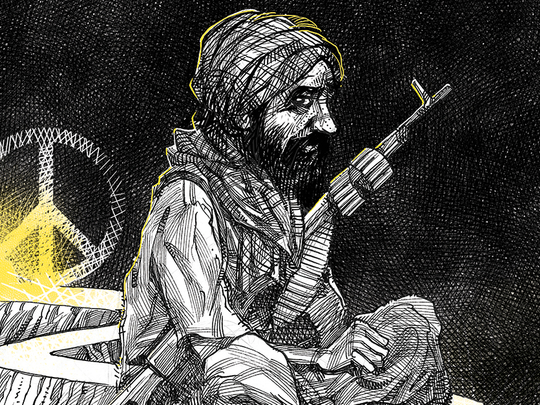
When United States President Barack Obama received Pakistan Prime Minister Nawaz Sharif at the White House on October 22, they expressed their commitment to advance an Afghan-owned and Afghan–led peace and reconciliation process between the unity government headed by Afghan President Ashraf Gani and the Taliban.
To achieve this objective, Obama and Sharif, in their joint statement at the end of their two-hour meeting, called on Taliban leaders to enter into direct talks with the Afghan government and work towards a sustainable peace settlement.
The joint statement also envisaged a role for Pakistan in facilitating the reconciliation process to help end insurgent violence in Afghanistan. Obama not only commended Pakistan for hosting and facilitating the first public talks between the Afghan government and the Taliban on July 7 in the Pakistani hill-station of Murree, but also highlighted the opportunity presented by Islamabad’s willingness to facilitate the Afghan reconciliation process.
It is obvious from the joint statement that the US has placed the onus of responsibility for achieving the difficult objective of restoring peace and stability in Afghanistan on the Taliban and Pakistan. The Taliban leadership wasn’t part of the deliberations at the White House, but Pakistan was strongly represented by its prime minister, who was assisted by civil and military officials.
In a way, it was assumed that the Pakistan government would be able to persuade the Taliban leadership to agree to hold peace talks with the Afghan government as it had done in July this year. Many Pakistanis, including officials, are worried that their government had raised undue expectations regarding its influence on the Taliban by repeatedly offering to facilitate the peace talks. They believe Islamabad would now be asked and expected to revive the peace talks whenever problems arise and also make the process a success. Failure to do so would invite criticism, particularly from the Afghan government, which is of the firm belief that Pakistan is using the Taliban as proxy to dominate Afghanistan.
As if trying to highlight the difficult path ahead, Sharif pointed out in his speech at the United States Institute of Peace, after his meeting with Obama, that though he had renewed offer of assistance to Gani in reviving the peace talks, Pakistan cannot bring the Taliban to the negotiations table and at the same time kill them as demanded by Kabul. This was a clear message that Islamabad won’t be able to do these two divergent tasks at the same time because it could either help persuade the Taliban to negotiate with the Afghan government or take punitive action against them. He was telling all parties to the conflict to make renewed peacemaking efforts instead of continuing the use of force.
This argument was reinforced by an unnamed Pakistani security official earlier who ruled out action against Afghan groups allegedly operating from Pakistan’s soil. He made it clear that Pakistan cannot wage the Afghan war on its territory as it was essentially a fight between Afghan armed groups that have been fighting each other for years in Afghanistan.
Much now depends on the new Taliban head, Mulla Akhtar Mohammad Mansour, who has gradually consolidated his position by winning over late Taliban supreme leader Mulla Mohammad Omar’s family and others opposed to his leadership. Though still facing some opposition from Taliban figures representing the old guard, Mansour’s status as the supreme leader is unassailable. His strengthened status as the Taliban’s new “Amirul Momineen” (commander of the faithful) would allow him to take tough decisions even though he until now has opted for war instead of peace.
It is true that Mansour as the de facto Taliban head had approved the first round of peace talks with the Afghan government on July 7, but his stance has subsequently undergone a change. In his first public statement after succeeding Mulla Omar on July 29, he rejected peace talks with Kabul and insisted on waging war until victory. To reinforce his stand, he sent a message to Taliban fighters on October 27 to step up attacks to achieve further victories after their recent successes in the battlefield, including the brief capture of Kunduz city on September 28, and rid Afghanistan of “the occupying forces and corrupt rulers”.
The real challenge now is to convince Mansour and his 20-member Rahbari Shura (leadership council) that the Taliban interests would be best served by negotiating a political settlement instead of waging an endless war. All except the Taliban agree that there cannot be a military solution to the ongoing Afghan war. The main Taliban demand is the withdrawal of the remaining almost 14,000 US-led foreign forces from Afghanistan, though enforcement of Sharia has also been demanded.
While recently announcing his decision to slowdown the pullout of US forces from Afghanistan in view of the deteriorating security situation resulting from the record rise in Taliban attacks post-2014, Obama made a calculated offer to the Taliban. He said the only way Taliban could get the foreign forces to withdraw from Afghanistan is by reaching a political settlement with the Afghan government.
It is now for the Taliban to decide if this could serve their purpose. Also, Kabul and Islamabad would have to overcome their distrust to jointly work for peace by bringing the Taliban into the political mainstream. It is a tall order, but is the best option due to lack of better options.
Rahimullah Yusufzai is a senior journalist based in Peshawar.









